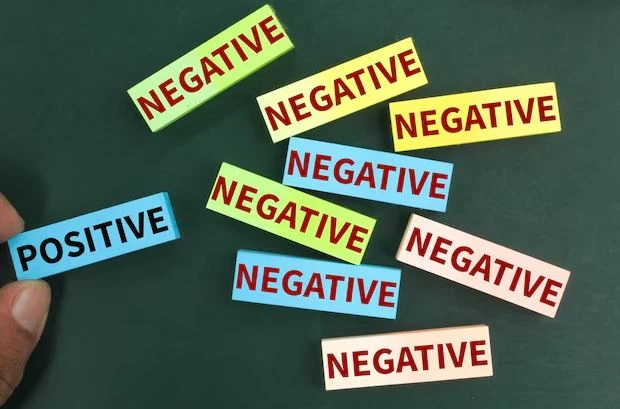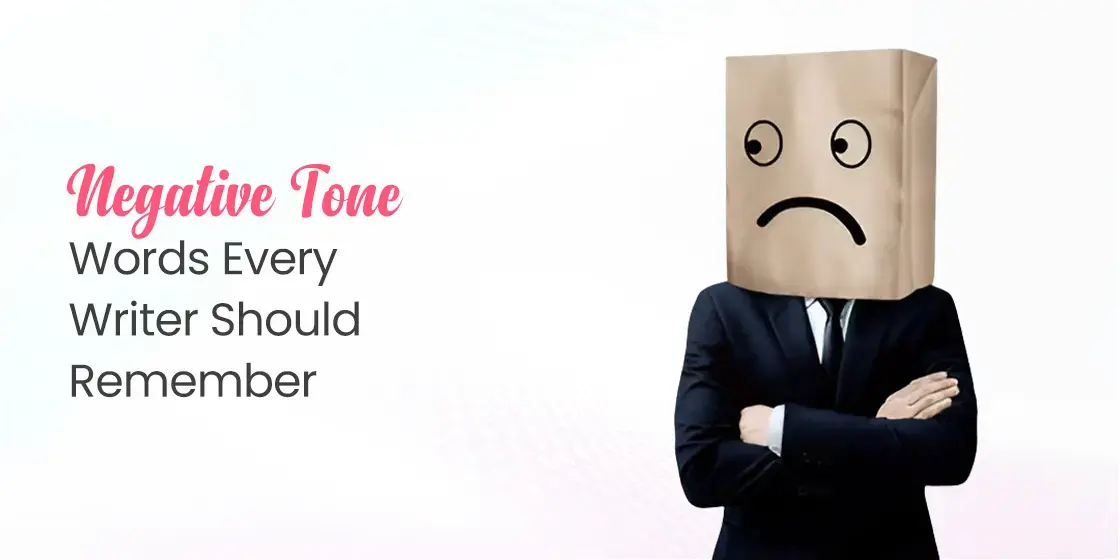Table of Content
Take a Look at the List of Negative Words for Targeted Writing
Building a vocabulary with a list of negative words is important for writers. These words come handy in different scenarios where something negative is needed to be highlighted boldly. It could be anything ranging from a trait of a person or things with negative background. Whenever these words are used appropriately, they define the context of the sentence quite openly. The negative tone words are therefore important to remember, especially if you are trying to highlight something precisely.
A lot of times, beginners regularly look into the dictionary to find negative tone words. They are forced to do this because most of them do not remember these words naturally. This practice should be avoided and remembering them at fingertips should be seen as a way forward. To do that, beginners should try to build a vocabulary containing various types of negative tone words. It should not be restricted to any letter, as that could make the list very limited.
If you think learning these words can bolster your article writing services, read this blog in detail. It will list down some important negative tone words that can be used by the writers in different types of contexts. Let’s start from the basics understanding what are negative tone words and how they should be used in sentences.
What are Negative Tone Words?

Negative tone words are linguistic tools that carry a critical, pessimistic, or unfavorable connotation. These words are essential in writing as they add depth, nuance, and authenticity to the message being conveyed. By incorporating negative tone words, writers can express dissatisfaction, critique, or concern effectively, making their writing more impactful and emotionally resonant.
Such words play a crucial role in reflecting emotions like sadness, frustration, disappointment, or disapproval. They allow writers to articulate strong opinions, set the mood, and create a particular atmosphere within their work. Whether used in literature, persuasive speech topics, or everyday communication, negative tone words help to shape the reader’s perception and response to the message being delivered.
Furthermore, employing negative tone words thoughtfully can enhance the clarity and precision of a writer’s intent. They enable authors to present conflicts, challenges, or opposing viewpoints in a compelling manner. However, overuse of such language may come across as overly harsh or pessimistic, so it is important to strike a balance to maintain credibility and effectiveness in writing.
When to Use Negative Words?

Negative tone words are used in specific conditions. They are used to define a precise scenario or trait of a person. These words cannot be used excessively, as their meaning is very definite. Here are some key areas where you could use negative words effectively.
Elaborate Empathy
Negative tone words can be seamlessly intertwined into prose to emphasize a particular situation, making it more vivid and memorable for the reader. By carefully selecting words with critical or pessimistic connotations, writers can shape the tone of their work to evoke strong emotions such as disappointment, frustration, or sorrow. This intentional use of language ensures that the reader fully grasps the gravity of a situation or the intensity of a character’s feelings, adding a layer of realism and complexity to the writing.
When used effectively, negative tone words encourage readers to engage with the text on a deeper level. Instead of passively absorbing information, they are prompted to reflect on the emotions conveyed, analyze the underlying themes, and consider the implications of the message. This deeper level of engagement fosters a stronger connection between the reader and the material. Whether in literature, or digital copywriting, the strategic use of negative tone words can shape the way audiences interpret and respond to a piece.
Highlight Positives Indirectly
Negative tone words can be particularly effective when used strategically to highlight positive aspects by way of contrast. By presenting a challenge, setback, or unfavorable situation first, writers can create a sense of tension that makes any subsequent resolution, success, or uplifting moment feel even more impactful. This technique enhances the emotional depth of the writing, allowing readers to fully appreciate the positive elements that follow.
Furthermore, the use of negative tone words can add a layer of realism and authenticity to a narrative, making positive words stand out as genuine and hard-earned rather than simply idealized. When writers acknowledge difficulties, frustrations, or obstacles, they create a more compelling and relatable story. Readers are more likely to connect with a narrative that acknowledges both hardships and victories, as this reflects real-life experiences.
Make Sentences Descriptive
One of the greatest advantages of incorporating negative tone words into writing is their ability to enhance the depth and descriptiveness of prose. These words allow writers to convey emotions such as frustration, disappointment, or sorrow with greater precision, making their sentences more vivid and engaging. By using language that carries a critical or pessimistic connotation, writers can paint a more detailed picture of a scene, situation, or character’s emotional state.
Additionally, negative tone words contribute to a more immersive reading experience by intensifying the mood and atmosphere of a piece. Whether used to express tension in a dramatic moment, highlight the severity of a conflict, or underscore the weight of a character’s internal struggles, these words bring a sense of realism and urgency to the text. They enable writers to craft compelling narratives that evoke strong reactions from readers, making the story more memorable and impactful.
Important Negative Tone Words to List Down
If you are running short of ideas or not finding enough negative words for particular use cases, take a look at the list given below. It contains different words that can be used to elaborate negative sentences in a more direct and efficient manner.
- Angry: He was angry when he realized he had been lied to.
- Bitter: Her bitter words lingered long after the argument ended.
- Cynical: He had a cynical outlook on politics, never trusting any promises.
- Harsh: The teacher’s harsh criticism discouraged the students.
- Hostile: His hostile attitude made it difficult to have a productive conversation.
- Sarcastic: Her sarcastic remarks made it clear she was not impressed.
- Pessimistic: She had a pessimistic view of the future, always expecting the worst.
- Melancholy: The melancholy tune of the violin filled the empty room.
- Resentful: He felt resentful toward his coworker for taking credit for his work.
- Frustrated: She was frustrated after trying to explain multiple times.
- Disappointed: He was deeply disappointed by his friend’s betrayal.
- Miserable: The miserable weather matched his mood perfectly.
- Gloomy: The gloomy sky cast a shadow over the entire city.
- Dismal: The dismal news of the company layoffs spread quickly.
- Hopeless: She felt hopeless after failing the exam despite studying hard.
- Irritated: He grew irritated as the waiting time stretched longer and longer.
- Skeptical: She was skeptical of his sudden change of heart.
- Defeated: After losing the final match, he walked away feeling defeated.
- Morose: His morose expression revealed how deeply he was affected.
- Arrogant: His arrogant tone made it difficult for anyone to take him seriously.
- Contemptuous: She gave him a contemptuous look before walking away.
- Accusatory: His accusatory tone made it sound like she was guilty.
- Condescending: The manager’s condescending remarks were very depressing.
- Insulting: His insulting comments left everyone in the room speechless.
- Jealous: She couldn’t help but feel jealous of her friend’s success.
- Aggravated: He was aggravated by the constant noise outside his window.
- Apprehensive: She felt apprehensive about the big decision ahead.
- Oppressive: The oppressive heat made it hard to breathe.
- Vindictive: His vindictive nature made it difficult to trust him.
- Somber: The somber mood at the funeral was palpable.
- Wrathful: His wrathful expression warned everyone not to approach him.
- Manipulative: She had a manipulative way of getting what she wanted.
- Dismissive: He was dismissive of their concerns, refusing to listen.
- Ridiculing: His ridiculing laughter embarrassed her in front of everyone.
- Stern: The principal gave a stern warning to the misbehaving students.
- Judgmental: His judgmental attitude pushed people away.
- Mournful: The mournful cry of the mother echoed through the hospital halls.
- Regretful: She was regretful about the harsh words she had spoken.
- Distressed: The distressed child clung to her mother tightly.
- Annoyed: He was annoyed by the constant interruptions during his work.
- Insecure: She felt insecure about speaking in front of a large audience.
- Threatening: His threatening glare made everyone uneasy.
- Overwhelmed: She was overwhelmed by the sheer amount of work.
- Dejected: He looked dejected after receiving yet another rejection letter.
- Foreboding: A sense of foreboding filled the air as the storm approached.
- Cruel: His cruel words cut deeper than any knife.
- Desperate: In a desperate attempt to fix things, she apologized repeatedly.
- Paranoid: He grew paranoid that someone was always watching him.
- Envious: She felt envious of her friend’s luxurious lifestyle.
- Unforgiving: His unforgiving nature made it impossible to mend their relationship.
Frequently Asked Questions
| What are negative tone words? Negative tone words are words that convey emotions such as sadness, anger, or frustration. They help express dissatisfaction, highlight conflicts, or create a somber mood in a text. |
| When should writers use negative words? Writers should use negative words when they want to emphasize conflicts, or express criticism in their writing. These words help convey disappointment, tension, or contrast to make the message more compelling and thought-provoking. |
| What is the meaning of arrogant negative word? The negative word arrogant describes someone who is overly proud, self-important, and dismissive of others. It conveys a sense of superiority, where a person believes they are better or more knowledgeable than those around them. |
Final Words
That concludes our entire article in which we have discussed different types of negative tone words in detail. Remembering these words is important for writers because they are required in different types of sentences that are negative contextually. The article has also defined various examples how these words can be used in sentences. It is therefore a good read for everyone who want to learn these words, as well as their correct usage in articles, columns and other content pieces.

Unleash your brand story`s potential with eContentSol – your creative writing companion. We craft narratives that captivate. Ready to elevate your content game? Dive into creativity with us and let`s bring your ideas to life.


